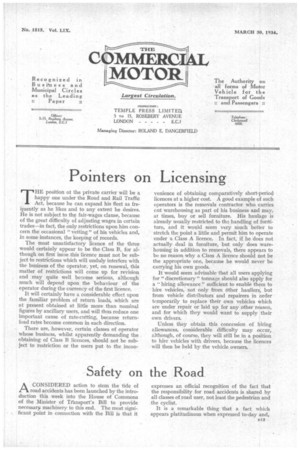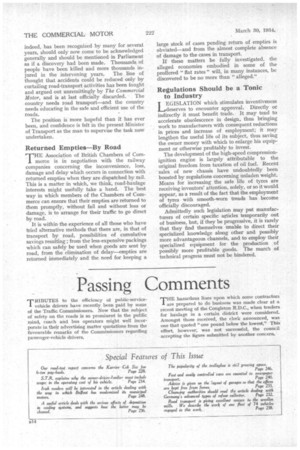Safety on the Road
Page 19

Page 20

If you've noticed an error in this article please click here to report it so we can fix it.
ACONSIDERED action to stem the tide of road accidents has been launched by the introduction this week into the House of Commons of the Minister of Transport's Bill to provide necessary machinery to this end. The most significant point in connection with the Bill is that it expresses an official recognition of the fact that the responsibility for road accidents is shared by all classes of road user, not least the pedestrian and the cyclist.
It is a remarkable thing that a fact which appears platitudinous when expressed to-day and, B13 indeed, has been recognized by many for several years, should only now come to be acknowledged generally and should be mentioned in Parliament as if a discovery had been made. Thousands of people have been killed and more thousands injured in the intervening years. The line of thought that accidents could be reduced only by curtailing road-transport activities has been fought and argued out unremittingly by The Commercial Motor, and is at last officially discarded. The country needs road transport—and the country needs educating in the safe and efficient use of the roads.
The position is more hopeful than it has ever been, and confidence is felt in the present Minister of Transport as the man to supervise the task now undertaken.
Returned Empties—By Road
THE Association of British Chambers of Commerce is in negotiation with the railway companies concerning the inconvenience, loss, damage and delay which occurs in connection with returned empties when they are dispatched by rail. This is a matter in which, we think, road-haulage interests might usefully take a hand. The best way in which members of the Chambers of Commerce can ensure that their empties are returned to them promptly, without fail and without loss or damage, is to arrange for their traffic to go direct by road.
It is within the experience of all those who have tried alternative methods that there are, in that of transport by road, possibilities of cumulative savings resulting ; from the less-expensive packings which can safely be used when goods are sent by road, from the elimination of delay—empties are returned immediately and the need for keeping a large stock of cases pending return of empties is obviated—and from the almost complete absence of damage to the cases in transport. If these matters be fully investigated, the alleged economies embodied in some of the proffered "fiat rates" will, in many instances, be discovered to be no more than "alleged."
Regulations Should be a Tonic to Industry
LEGISLATION which stimulates inventiveness deserves to encounter approval. Directly or indirectly it must benefit trade. It may tend to accelerate obsolescence in design, thus bringing work to manufacturers with consequent reductions in prices and increase of employment; it may lengthen the useful life of its subject, thus saving the owner money with which to enlarge his equipment or otherwise profitably to invest.
The development of the high-speed compressionignition engine is largely attributable to the original freedom from taxation of oil fuel, Recent sales of new chassis have undoubtedly been boosted by regulations concerning unladen weight. Means for increasing the safe life of tyres are receiving inventors' attention, solely, or so it would appear, as a result of the fact that the employment of tyres with smooth-worn treads has become officially discouraged.
Admittedly such legislation may put manufacturers of certain specific articles temporarily out of business, but, if they be progressive, it is rarely that they find themselves unable to direct their specialized knowledge along other and possibly more advantageous channels, and to employ their specialized equipment for the production of possibly more profitable goods. The march of technical progress must not be hindered.












































































